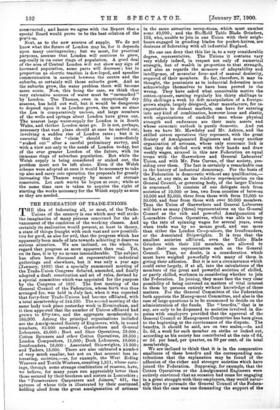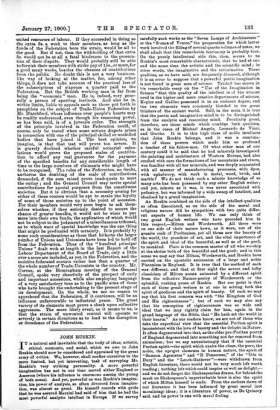THE FEDERATION OF TRADE-UNIONS. T HE idea of federating all, or
most, of the Trade- Unions of the country is one which may well strike the imagination of many persons concerned for the ad- vancement of the condition of the working classes. And certainly its realisation would present, at least in theory, a state of things fraught with such vast and new possibili- ties for good, as also for evil, that the progress which has apparently been made of late towards achieving it deserves serious • attention. We are inclined, on the whole, to regard that progress as more apparent than real. Yet, on its face, it is by no means inconsiderable. The subject has often been discussed at representative industrial gatherings and elsewhere, but it was only a year ago (January, 1899) that a specially summoned meeting of the Trade-Union Congress debated, amended, and finally adopted a draft constitution and set of rules, devised by a special committee which was appointed for the purpose by the Congress of 1897. The first meeting of the General Council of the Federation, whose birth was thus arranged for, was held in July last, when it was reported that forty-four Trade-Unions had become affiliated, with a total membership of 344,930. The second meeting of the same body took place yesterday week in Birmingham, and it then appeared that the number of Unions affiliated had grown to fifty-two, and the aggregate membership to 380,000. Among the principal organisations included are the Amalgamated Society of Engineers, with, in round numbers, 85.000 members ; Gasworkers and General Labourers, 45,000 ; Boot and Shoe Operatives, 29.000 ; Cotton Spinners and other Cotton Operatives, 38,500; London Compositors, 11,000; Dock Labourers, 10,000 ; Ironfounders, 18,000 ; Associated Shipwrights, 15 500; and Tailors, 15.000. There are also embraced a number of very much smaller, but not on that account less in- teresting, societies,—as, for example, the West Riding Weavers and Textile Workers, counting 1,911, whose earn- ings, through some strange combination of reasons, have, we believe, for many years run appreciably lower than those secured by their brethren and sisters in Lancashire ; the "Perseverance Carpenters and Joiners," 451, the aptness of whose title is illustrated by their continued holding aloof from the great amalgamation of artisans in the same attractive occupations, which must number some 40,000; and the Sheffield Table Blade Grinders, 153, who, unable to join in one Union with their neigh- bours engaged in grinding blades for pocket-knives, are desirous of federating with all industrial England.
No one can deny that this list is, to a very considerable degree, representative. The Unions it contains vary very widely indeed, in respect not only of numerical strength, but of wealth in proportion to that strength, and also as regards the measure of adaptability and intelligence, of muscular force and of manual dexterity, required of their members. Su far, therefore, it may be thought, the pessimists as to industrial federation must acknowledge themselves to have been proved in the wrong. They have asked what conceivable motive the cotton-spinner, earning regularly his thirty shillings to fifty shillings a week by deft manipulation of a foreign. grown staple, largely designed, after manufacture, for re- exportation to distant markets, can have for entering into any kind of combination, however loose and elastic, with organisations of unskilled men whose physical strength and endurance are their main assets and whose economic outlook is purely domeetic. And yet here we have Mr. Mawdsley and Mr. Ashton, and the skilled cotton operatives they represent, with the great Society of Amalgamated Engineers and many another organisation of artisans, whose only economic link is that they do skilled work with their hands and draw weekly wages, arrayed in this new Federation on equal terms with the Gasworkers and General Labourers' Union, and with Mr. Pete Curran, of that society, pre- siding over them. The fact is certainly a remarkable one in the history of industrial democracy. For the basis of the Federation is democratic without any qualification,— so far, at any rate, as the relative representation on the General Council, or governing body, of the larger Unions is concerned. It consists of one delegate each from societies of 10,000 or less, two from societies of between 10,000 and 25,000, three from those with from 25,000 to 50.000, and four from those with over 50,000 members. Thus the Union of Gasworkers and General Labourers will have as many (three) representatives on the General Council as the rich and powerful Amalgamation of Lancashire Cotton Operatives, which was able to keep up the rate of spinning wages for several years, even when trade was by no means good, and one more than either the London Compositors, the Ironfounders, or the Associated Shipwrights. It is true that the smallest societies affiliated, even the Table Blade Grinders with their 153 members, are allowed to have their one representative each on the General Council. That, no doubt, is a consideration which must have weighed powerfully with many of them in giving their adhesion. But it is not a circumstance which could enter largely, if at all, into the calculations of the members of the great and powerful societies of skilled, or partly skilled, workmen in considering whether to join the Federation. In joining, they must face the very clear possibility of being outvoted on matters of vital interest to them by persons entirely without knowledge of those matters. For the General Committee of the Federation both appoints the Management Committee, and also in the case of large questions is to be summoned to decide on the administration of the funds. The "benefits," that is to say, are only to be dispensed to societies involved in dis- putes with employers provided that the approval of the General Council or Management Committee has been given to the beginning or the continuance of the dispute. The benefits, it should be said, are on two scales,-5s. and 2s. 6d. a week for each member on strike or locked out, according as his society has contributed at the rate of 6d. or 3d. per head, per quarter, on 90 per cent. of its total membership.
We are inclined to think that it is in the comparative smallness of these benefits and the corresponding con- tributions that the explanation may be found of the adhesion of the richer and stronger societies which have joined the Federation. Supposing, for example, that the Cotton Operatives or the Amalgamated Engineers were entirely convinced that an occasion had come for engaging in a great struggle with their employers, they would natur- ally hope to persuade the General Council of the Federa- tion that the case was one demanding the support of the united resources of labour. If they succeeded in doing so the extra 5s. a week to their members, as long as the funds of the Federation bore the strain, would be all to the good. But if not, then the withholding of that extra 5s. would not be at all a fatal hindrance to the prosecu- tion of their dispute. They would probably still be able to furnish their members with strike pay of 15s., or more, for a good many weeks, besides the chances of contributions from the public. No doubt this is not a very business. like way of looking at the matter, for, among other things, it does not take account of the practical loss of the subscriptions of sixpence a quarter paid to the Federation. But the British working man is far from being the " economic " man. He is, indeed, very gene- rally a person of sporting instincts. And also he is. within limits, liable to appeals such as those put forth in pamphlets on the subject of Trade-Union Federation by Mr. Blatchford, whose influence over people's hearts may be readily understood, even though his reasoning power, as has been said, is of a juvenile order. The strength of the principle involved in the Federation could, of course, only be tested when some serious dispute arises in connection with one of the principal skilled or unskilled bodies that have joined it. The best opinion, we imagine, is that that test will prove too severe. It is gravely doubted whether careful actuarial calcu- lations would prove the proposed scales of contribu- tion to afford any real guarantee for the payment of the specified benefits for any considetable length of time to the large numbers of claimants who might have to be recognised. The rules of the Federation, no doubt, authorise the doubling of the scale of contributions demanded, if the sum raised prove inadequate to meet the outlay ; and the General Council may invite special contributions for special purposes from the constituent societies. But it is obvious that a necessity arising for either of these courses would be apt to strain the loyalty of some of those societies up to the point of secession. For their members would very soon begin to ask them- selves whether, if they seriously desired to secure the chance of greater benefits, it would not be wiser to pay more into their own funds, the application of which would not be subject to the judgment of a miscellaneous tribunal, as to which want of special knowledge was the one thing that might be predicated with certainty. It is probably by some such considerations as these that hitherto the larger number of Unions and Unionists have been led to hold off from the Federation. Thus of the "hundred principal Unions " dealt with at length in the last Report of the Labour Department of the Board of Trade, only a little over a score are included, as yet, in the Federation, and the societies federated contain rather less than a quarter of the whole number of Trade-Unionists in the country. Mr. Curran, at the Birmingham meeting of the General Council, spoke very cheerfully of the prospect of early and important accessions, while also employing language of a very satisfactory tone as to the pacific aims of those who have brought the undertaking to the present stage of its development. On the whole, we see no reason to apprehend that the Federation, if it continues, will be an influence unfavourable to industrial peace. The great variety of its elements must prove a check upon collective aggression. The more likely event, as it seems to us, is that the strain of unwonted control will operate so severely in certain directions as to lead to the disruption or decadence of the Federation.



















































 Previous page
Previous page